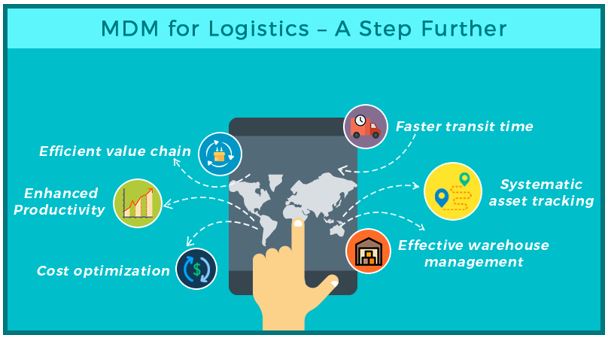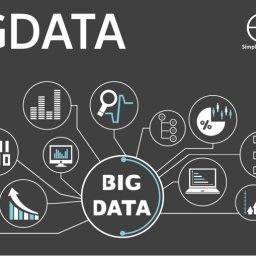
Big Data has already established its place on the horizon, as postmodern technologies user in a new era of global business. It is hailed as the cure for every problem, the key to scaling up and the difference between guess-work and insightful decisions. Big Data does indeed do all of these things, but it is by no means a magic wand.

Just generating big data solutions is not enough. In fact, big vaults of data are more confusing than they are insightful! Big Data represents individual pieces of a puzzle, which are useless without someone to put them together. Master Data Management (MDM) puts the different pieces together and makes the puzzle meaningful. It is a 360-degree data architecture of all domains of a business – customers, employees, products, vendors, etc.
As global distribution networks have become increasingly complex, the landscape of Logistics Management has changed drastically over the last 20 years. Most notable have been the vehement drive to cut costs post-recession and integrate Information Technology into Supply Chain Management.
In the same period, Data has become a new natural resource unto itself, and companies have begun to see its value in scaling up and making much smarter decisions. The ‘Data Age’ is upon us and almost every company is sitting on galaxies worth of data.
“The issues we face [in logistics] have changed dramatically, and the tools have not changed enough. If you’re looking at software designed 15 years ago, think of what PCs and TVs were like 15 years ago, and think what they’re like today.” – Mitch Weseley (popularly known as the father of modern Transportation Management Systems (TMS)
How MDM works
Today, the rate of data growth is itself doubled every year. A large chunk of this growth is generated by Logistics Companies, as they form the backbone of the global economy.
But does simply generating so much Big Data means that it is adding value? Short answer: No!
Having generated galaxies of data, the question must arise “What additional value does data carry and how does a company utilize it?” Research shows that most companies spend 80% of their resources on generating data and only 20% on adding value or generating insights.
For a logistics company, the range and volume of data is huge – data from online forms, ERPs, CRM, routing data from fleets, employee profiles, vendors, and so much more! A Master Data Management strategy integrates all this data so that it is uniform across domains and departments.
However, just as Big Data is not an all-automated magic wand, neither is Master Data Management solutions. MDM cannot work to its full capacity without commensurate input by humans. It is, after all, the thoroughness and the expertise of the human touch which separates a value-generating MDM from a value-depreciating one (Imagine all that could go wrong with incorrect data!). Here are a few success factors for MDM implementation:
Intra-Politics
With technology becoming increasingly complex, Business units offer have different insights on decisions for growth than IT units. For an MDM strategy to work, both the business units and the IT department must accept and support substantial change.
Data Governance and Data Quality
First, a clear, transparent and well-managed (hierarchically) data strategy is fundamental to a good MDM strategy. Second, data categories, ambiguities and in-completions have to be carefully micro-managed for the strategy to be effective.
Data Science Expertise
Finally, the expertise and technology involved in MDM is extremely complex. Decisions about which domain to work on first and how to interpret insights are the result of training and experience. It follows naturally, that qualified data expertise is indispensable.
Benefits of MDM for Logistics
The benefits of MDM vary depending on which domains and departments are being analysed. For instance, MDM will provide insights on customer types and behaviours for sales and marketing decisions on one hand, but will also provide insights on supply chain management based on routing data.
The whole point is to create a data architecture, which is so thoroughly inter-referenced that any department can benefit from it.
That being said, here are some universal benefits of an MDM strategy for Big Data in Logistics –
Centralized Data Architecture
The greatest benefit of MDM is that a manager can access data from Customers, Vendors, Products, Equipment, Finance, Employees and Routing in one place.
Optimization and Efficiency
The most obvious and instant benefit is Business Efficiency. As you leverage distribution, routing and customer data to draw insights about your operations, supply chain inefficiencies become clear. At the same time, automation makes repetitive tasks easy and cheap.
Cracking the Last Mile
The Last Mile is usually the most expensive and cost-inefficient part of the supply chain. MDM Solutions makes it possible to cut costs and solve the ‘travelling salesman problem.
Customer Engagement
The ability to integrate data from CRM, Routing and other departments allow a company to gauge customer behaviours, as well as its own service capacity. Moreover, logistics companies collect data from across the globe, enabling them to target desired customers on a global scale.
Master Edits
Tired of maintaining multiple databases? An MDM is the only solution to your problem. Edits in the master data will reflect in all sub-databases, thereby saving you hundreds of unnecessary errors!
Data Reliability
Instead of having to access each database, simply access the Master Database. Moreover, the Master Data is cross-referenced across departments and the most authoritative source of internal information possible.
Backup
With a centralized database, backing up a company’s entire data is simple. Even if data in one database is damaged or lost, the Master Database allows easy recovery.
ESSPL is the leading company in the IT Solution and Development, If you are looking for any kind of software development, solution and outsourcing then you can contact us. If you like this article then please share it with your friends.













